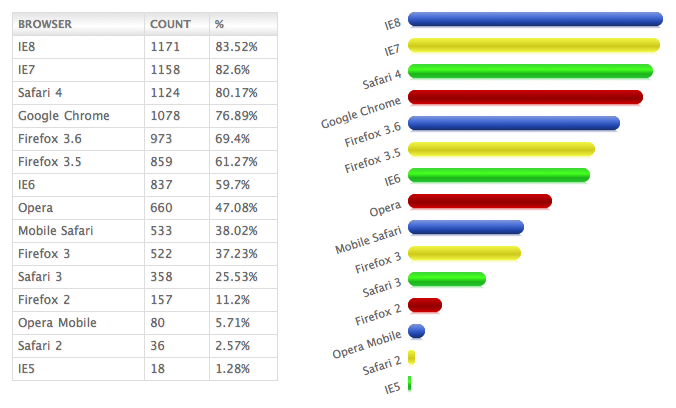Web development status in 2010 according to Web Directions

John Allsopp, who has been working on CSS, web design and development for quite a while, as well as co-founder of the Web Directions conference on web design and development, published the results of a survey on various aspects of web development.
The purpose of this survey is to look at the dry numbers of statistics, and try to consider those techniques and technologies that are used by web designers and developers. Over time, the authors of the survey hope to trace changes in the design and development under the web. The survey lasted a month, or rather, Ferval 2010. In total, 1402 people voted. These are mainly web designers, developers, as well as people who are somehow interested in web development from Europe, North America, Australia and New Zealand.
What are the results?
What OS is used in daily work?


What browser is used in daily work?

')
What features in the browser are most important?

Which browsers test written sites?

What markup language do they use?

What doctype is announced?

Do you already use HTML5 markup?

Do you use tabular layout?

As you can see, 60% answered that only under the pretext of death!
Which approach best fits your web design philosophy?

Which approach is most appropriate for your approach to developing cross-browser applications?

What do you most often use CSS for?

Do you use javascript?

What JavaScript frameworks and libraries do you use?

The undisputed leader is jQuery.
Do you separate the JavaScript code from the main page markup code?

What type of content do you use in your apps?

What hardware are your sites hosted on?

How software maintains your sites?

What OS is used on your servers?

What databases do you use?

What server-side programming languages do you use?

Instead of conclusion
It seems to me that the survey is quite extensive and covers various aspects of web development, it’s a pity that only 1402 people took part in the voting. Still, this is not enough.
Here I have placed, in my opinion, the most important questions, but in the original they are much larger.
More details on the survey results can be found on the Web Directions website.
Source: https://habr.com/ru/post/92296/
All Articles